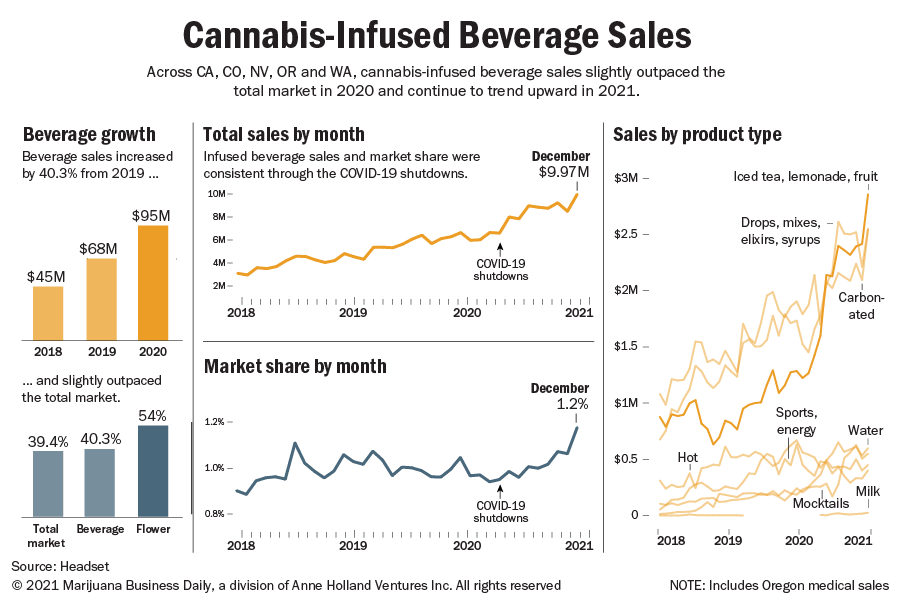Sales of cannabis-infused beverages were up 40% last year, as companies sought to capitalize on new marijuana consumers seeking a familiar form of consumption and those looking for an alternative to alcoholic drinks.
Marijuana beverage companies, for example, have been cashing in on health-related trends such as Dry January, when alcohol drinkers abstain for the month and look for alternative ways to relax.
“People are very mindful of the impact of alcohol on their health and their looks,” said Tracey Mason, co-founder and CEO of cannabis-infused, alcohol-free wine company House of Saka, based in California’s famed Napa Valley winemaking region.
According to data from Seattle-based cannabis analytics firm Headset, sales of marijuana-infused beverages increased 40.3% last year versus 2019 across recreational markets in California, Colorado, Nevada, Oregon (medical and adult use) and Washington state.
Cannabis-infused beverage sales rose from $67.8 million in 2019 to $95.2 million in 2020.
That category barely edged out growth in the overall marijuana market, which grew 39.4% over the same time period.
Despite the strong growth, the infused-beverage market remains a small portion of the overall marijuana product mix.
The market share of cannabis beverages has been relatively steady over the past three years, holding right at 1% for annual share in 2018, 2019 and 2020, according to Headset.
However, cannabis-beverage market share appears to be trending up in early 2021, with a 1.2% stake year-to-date.
The strong demand for infused beverages has not propped up prices – at least not yet.
Cannabis wholesale marketplace LeafLink, which has offices in Los Angeles and New York, reports that prices for marijuana beverages are trending down.
As of January 2021, the average wholesale price for cannabis-beverage products on LeafLink was $8.58 per single serving, down 1.1% from $8.67 in January 2020.
Throughout 2020, the wholesale price of infused beverages sold on LeafLink fluctuated widely, reaching a high of $8.75 in April and a low of $7.59 in June.
Pop the top
It might seem obvious, but people know how to drink a beverage.
That familiarity helps the beverage category attract new customers who might be intimidated by the prospect of rolling a joint or picking up something even more involved, such as a dab rig.
“A beverage is not something you have to smoke or light up,” said Lindsay Levin, chief marketing and sales officer for Fluresh, a vertically integrated cannabis company based in Grand Rapids, Michigan.
Also, packaged drinks blend in with normal lifestyles.
Say you’re having lunch or stopping by a gas station, there’s a beverage involved, said David Farris, vice president of sales and marketing for Planet 13, a vertically integrated cannabis company based in Las Vegas.
“Beverages are approachable,” he added.
Matt Melander, chief financial officer of Levia, a cannabis-infused seltzer brand based in Georgetown, Massachusetts, agreed that the familiarity of beverages can help bring new consumers to marijuana.
“Everyone knows how to crack a can top,” he said.
Health-minded
Beverages are also more acceptable in a social situation compared to smoking.
“You can pour a beverage everywhere,” said House of Saka’s Mason.
She added that the company’s sales spiked during Dry January, second by month in sales only to April, which gets a boost from 4/20, the unofficial cannabis holiday.
To that end, consumers looking to avoid alcohol hangovers or the higher calories and sugar associated with other cannabis edibles can turn to a product such as infused sparkling water.
“There are absolutely a lot of consumers looking for alternatives to alcohol,” said Levin in Michigan.
That’s in line with what Levia is trying to produce. Troy Brosnan, co-founder and chief operating officer, said the company’s goal was to create a sugar-free cannabis product with zero calories.
Farris in Nevada agreed that consumers see beverages as a healthier option.
“There is a big market out there who’s looking for a more health-conscious” alternative to smoking, he added.
Rapid onset
One of the challenges cannabis-infused beverages have is competing with the quick feeling of relaxation that a glass of wine or beer can provide.
Liz Gottbrecht, director of brand marketing at Lantern, a cannabis e-commerce marketplace based in Boston, highlighted the importance of marijuana beverages working quickly.
“Most consumers already have experience consuming an alcoholic beverage and they know when to expect that feeling,” she said. “It takes the stress out of, ‘I wonder how this is going to affect me?’”
Several infused-beverage companies claim their products take effect as quickly as five minutes once imbibed.
Fluresh makes a “drink enhancer,” which is a cannabis-infused liquid that’s intended to be added to another beverage with a 15-minute onset time. Levin said consumers like the control it gives them over the dosage and experience.
The quick-acting products also help to prevent the common misadventure of inexperienced consumers taking an edible, not feeling the effect right away, then growing impatient and taking another – and overconsuming.
“As more and more consumers come into this market, that’s something they’re looking for,” Levin added.
Looking ahead
Melander sees the future of beverages as “limitless” when considering the potential for drinks to be served at major events such as concerts or art shows.
Mason agreed, saying that as cannabis extraction technology and innovation improve, so will the quality of beverages.
While it might be a ways off before customers can walk into a bar and order an infused drink, several licensed cannabis markets have begun the process of licensing public-consumption lounges, which many businesses see as a good fit for beverages.
“That’s really going to be an exciting shift in the acceptance of cannabis and in mainstream society,” Gottbrecht said.
Bart Schaneman can be reached at [email protected].

